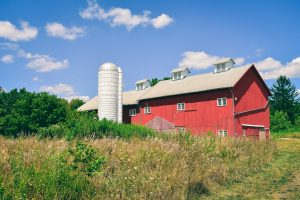This post is brought to you by the team at Trillium Mutual Insurance Company. Thanks for partnering with us!
What is a risk?
A risk is the potential damage to your property and results in a loss that was not planned. Losses are expensive to recover from and they are the main reason why people and businesses rely on insurance. Thus, your insurance company can protect you against the risk of uncertainty and the possibility of something going wrong.
Some risks an insurance policy will protect you from:
• fire
• lightning
• flood
• pipe rupture
• vandalism
• theft
Everyone faces a variety of risks and hazards in both our personal and business lives, but proper education and management can help minimize risk and create a safer environment for everyone.
Making a Personalized Risk Management Plan on Your Farm
With the adoption of technology over the past decade, the average family farm has grown in to a major operation spanning hundreds of acres, operating with larger equipment, tending to more livestock and perhaps even maintaining a robot or two. As a result, the chance of something going wrong is higher than it has been in the past.
Many different risks can be found around your operation, and at the end of the day, it’s your responsibility to minimize the potential for damage on your property. That’s why creating a risk management plan will help identify what could go wrong and prepare you in how to manage it. For example, identifying an issue with an electrical panel at an early stage may impose a cost to have it repaired, but this cost is minor compared to the possible devastation it could cause if ignored.
While you cannot plan for every different scenario, a well-rounded plan can help save you money, resources, and also increase your ability to react if something does go wrong.
We’re here to help.
Checking a variety of items while walking around and completing daily chores is the easiest way to minimize risk on your farm. Another option is to have a trained professional visit your farm to help provide advice and recommendations. Trillium Mutual has a team of trained risk inspectors that work with our broker partners, like McFarlan Rowlands, to help protect your livelihood, your family, and your assets. Our risk inspectors can tour your farm operations and identify any at-risk hazards that should be rectified. If you’d like to meet with a risk inspector, please speak to your Broker! In the meantime, we have created a list to guide you through creating a personalized risk management plan.
On a daily basis you should:
1. Maintain adequate clearance around electrical panels
2. Inspect fences and secure sliding doors when open or closed
3. Test your sump pump (can be tested monthly)
4. Keep fuel oil tanks clear of any debris or clutter and protect from impact
5. Make sure all chemicals are stored and labelled properly
On an annual basis you should:
1. Inspect your electrical and mechanical systems using thermal imaging technology
2. Install a fire detection/suppression systems in utility rooms
3. Inspect and clean wood burning appliances
4. Avoid the use of extension cords and hard wire where possible
5. Eliminate temporary heaters with permanent appliances installed by a qualified contractor
This overview of things to check in and around your farm will get you thinking about your own risk management plan and practices. There are many other items that should be checked on a daily basis and you can find a more comprehensive list here on Trillium Mutual Insurance’s website.
